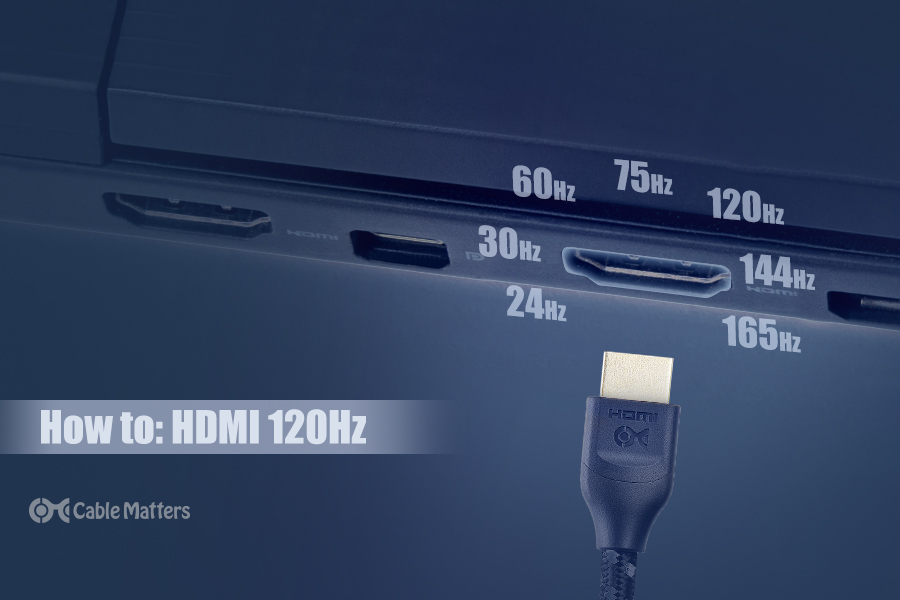
HDMI is one of the most popular cables for connecting PCs, consoles, set-top boxes, and Blu-ray players to TVs and monitors. That's because it's versatile, has great bandwidth, and supports a variety of resolutions and refresh rates. Although DisplayPort is always a great alternative, if you want to take advantage of a high refresh rate monitor or TV, an HDMI 120Hhz connection is more than possible.
Depending on what resolution you want to run at a high refresh rate, HDMI 120Hz may be more achievable on HDMI 2.0, or HDMI 2.1. If you're willing to buy a 4K 120Hz HDMI cable, though, there's no real limit to what kind of resolution and refresh rate you can hit with HDMI.
HDMI 120Hz at 1080p
The easiest high resolution to hit 120Hz at is 1080p. It's not only achievable on earlier generations of HDMI connection, but the hardware you'll need to achieve it is a relatively low bar too. The Xbox One X and S, and most gaming PCs of recent years can achieve this in the right game. As long as you have at least HDMI 1.4, 120Hz is doable on your compatible TV or monitor.
You can even do up to 144Hz if your display supports it. For uncompressed higher resolutions, though, HDMI 120Hz connections need a next-generation HDMI connection.
HDMI 120Hz at 1440p
For many gamers, 1440p is seen as the sweet spot, as it looks much better than 1080p, but isn't as demanding as 4K, making it easier to hit high refresh rates. Although HDMI 1.4 is possible at this resolution, you'd need to opt for 4:2:2 color subsampling to achieve it, which requires some technical tweaking and may harm the quality of the image you're rendering.
To get HDMI 120Hz at native 1440p, the best connector is HDMI 2.0. It has double the bandwidth of HDMI 1.4, supporting both 1440p at up to 144Hz and 4K at up to 60Hz without any form of compression.
You'll find HDMI 2.0 120Hz support on most modern graphics cards for desktop PCs, and the Xbox Series X and S games consoles, making it a widely available connection for hitting this excellent resolution for high refresh rate gaming.
HDMI 4K 120Hz
Outside of virtual reality, arguably the most demanding – but also the most immersive – gaming settings you can push for is 4K resolution at 120Hz. Only available on next-generation consoles and high-end gaming PCs, a 4K 120Hz HDMI cable solution for this kind of experience does exist, but you'll need the latest standard has to offer: HDMI 2.1.
For an HDMI 4K 120Hz connection, this most recent generation of the unified cable offers bandwidth in excess of just about anything that has come before. That enables it to not only support 120Hz at 4K, but up to 144Hz, and even 240Hz if you leverage Display Stream Compression (DSC). Even 8K resolution at 60Hz isn't outside the realm of possibility with such compression, either.
You'll need a 120Hz HDMI cable designed for this kind of resolution in mind. HDMI 2.1 is the first generation in many to require a new physical cable to handle the sheer bandwidth demands of a combined ultra-high resolution and refresh rate. Cable Matters offers a wide selection that will more than meet those needs.
You'll also need to make sure that you have a TV that is generation 2.1 HDMI 120Hz compatible. If you don't, you won't be able to take advantage of HDMI 2.1’s increased bandwidth.
If you can't, HDMI 2.0 4K 120Hz connections are possible, but you'll need to lower your expectations. To stay under HDMI 2.0's bandwidth limit, you'd need to force 8-bit color coding, lose HDR support, and reduce your chrome subsampling to at least 4:2:0. That's a steep cost just to achieve a second-generation 4K 120Hz HDMI cable connection.
DisplayPort: The 120Hz alternative
Does HDMI support 120Hz? Yes. Is it the best connector for 120Hz? Not necessarily. If you're running a graphics card from 2018 or 2019, chances are it comes equipped with a handful of DisplayPort options alongside a single HDMI 2.0 connector. If you've tried HDMI 4K 120Hz and found it lacking, then DisplayPort is your answer.
Where HDMI 2.0 is limited to compressed 120Hz gameplay at 4K, DisplayPort 1.4 cables have no such difficulties. With a bandwidth that's not far behind HDMI 2.1 connections, DisplayPort 1.4 is more than capable of 4K 120Hz, and can even handle 240Hz refresh rates if you enable DSC.